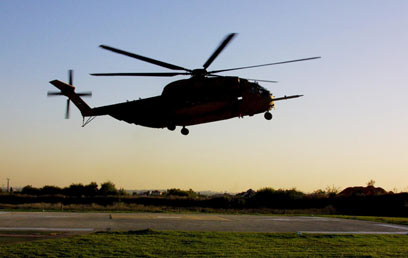Special report: Then I saw the missile hit the chopper
Reporter Ron Ben-Yishai, embedded with paratroopers, witnesses lethal helicopter strike. 'Suddenly I heard a pop. I looked up and saw the missile. A strong pink flame blazed at the end of it. I can't believe it, it's like in the movies, a soldier said to me'
Suddenly I heard a loud popping sound, like a huge cork being pulled out of a bottle. I looked up and saw the missile, apparently a Strela anti-aircraft missile, heading towards the Yasur (helicopter), with a strong pink flame blazing at its tip. All the troops froze in their tracks and watched. We saw the missile hitting the engine area of the Yasur. The missile's flame cast a fierce golden-pink glow on the propeller which was still spinning. The helicopter faltered and then flipped onto its side like a sinking ship and fell onto the slope. The helicopter's petrol and flares started to combust.

Yasur chopper (Archive photo: Doron Golan)
"I'm shocked. I'm shocked," the soldier beside me repeated. "I can't believe it. It's like in the movies." The whole thing lasted no longer than 20 seconds. But it wasn't until hours later, when the morning sun blazed, that we began to digest what had happened. It had been the fourth helicopter in our formation. We had all landed together, and the soldiers jumped out of the choppers almost simultaneously, but the helicopter that was hit lifted off first, and was apparently exposed to an SA7 missile fired from the direction of the Lebanese village of Yatar. "Imagine the missile had hit the plane before we landed," Brigade Commander Hagai Mordechai said, voicing the thought that had passed through all of our minds.
About ten minutes after the helicopter was hit, a rescue aircraft tried to approach it. It was firing flares in every direction it attempt to misguide any more missiles. The air rescue didn't take place in the end, out of concern more missiles might be fired. Paratroopers encircled the area and found the four bodies. Forces continued to secure the area, which is apparently still teeming with Hizbullah operatives.
'No laughter’
There were no more helicopter landings that night, due to concern there would be additional attacks. But the troops that had already landed were sufficient to go ahead with the mission. Towards morning, forces took up hidden positions on the ground, to monitor the rocket launch areas. The brigade commander, his assistant and I hid in a spot which swallowed us up and hid us completely. There was no laughter, especially in light of the helicopter hit that occurred a mere 300 meters from where we stood. You eat tuna, half a roll, and are cautious not to be exposed.
It is entirely clear to the troops that we are in the heart of Hizbullah country, the central rocket-launch area and the most active east of Tyre. Deep wadis, tangled vegetation, many houses. The commander of the paratroopers holds meetings with the battalion commanders by phone. They set missions for the next day and night. The fear is that the ceasefire will go into effect before the paratroopers manage to fulfill their missions fully. One of the forces destroyed a 24-missile rocket launcher as well as a Hizbullah military vehicle with an anti-tank missile.
Artillery covers the forces deployed in the field. In effect we are in a sort of bubble of fire, mostly artillery but also helicopter gunship fire. The rhythm of the artillery is ten shells per minute. The artillery fire around us prevents Hizbullah from getting close and thwarts the mortar shells they try to fire from time to time.
The envelope of fire is loud; you learn to distinguish the sound of distant fire and shells landing nearby. Our shells don't whistle; they hum before crashing. Their rockets make different sounds. You learn to tell the difference, and it becomes part of the background noise. The noises are part of what you might call the 'fighting routine in nature' that is taking place across south Lebanon.










